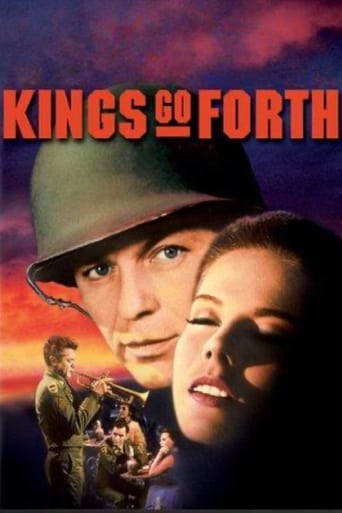abcj-2
KINGS GO FORTH (1958) is an excellent war drama with Frank Sinatra, Tony Curtis, and Natalie Wood and directed by Delmer Daves. It was one of those powerful films that I watched for the first few minutes, fully expecting to change the channel but was quickly hooked for the duration. I saw it a couple of years ago and forgot to note it on IMDb, but I remembered a war romantic drama with great narration. I was thrilled to stumble upon it streaming on Netflix, heard Frank Sinatra's distinct narration, and knew I'd found my missing film. It is set near the end of WWII on the French coast. Sinatra and Curtis are in the same army unit and there is a love triangle with a young and beautiful Wood who also possesses an important secret. The friendship is always uneasy between the two male stars, but they are able to do their jobs as soldiers in spite of their conflict. It is mostly a drama, but it does have enough war action to turn off some viewers, but I didn't find it to be too much action. It actually provided a realistic contrast considering the setting. Would it be a good drama without a good ending? No. It may not be the end you expect or pull for, but it works for this film. I highly recommend this film to any classic lover of this genre or these artists.
Jem Odewahn
This film certainly deserves more attention. One of Frank Sinatra's best performances, and certainly very good performances from Tony Curtis and Natalie Wod too. I have heard it flopped considerably in it's day. I guess it's because the original novel (which I haven't read, but which I have heard about) was censored for the screen, or made "happier" (though there's still a fair share of dark moments). Sinatra and Curtis are the American soldiers who both fall for the beautiful French girl Wood (trying an accent on for size), who is also half African-American. Sinatra loves her dearly, but Wood falls for the charming Curtis, with bad results. The film works well as character study of shy, introvert Sinatra and cocky extrovert Curtis. Leora Dana is truly excellent as Wood's mother. While Elmer Bernstein's score tends to overstate the cause at times, this is an involving drama. Unfortunately the war scenes aren't as interesting as the human drama.
MARIO GAUCI
My father owns a paperback edition of the Joe David Brown novel which inspired this film and I recall reading it many years ago. Ever since his Oscar triumph in FROM HERE TO ETERNITY (1953), Frank Sinatra tried to augment his typically light material with heavier stuff: in 1958, he had two of the latter back-to-back (along with Vincente Minnelli’s SOME CAME RUNNING) and, curiously enough, he finds himself with the less showier of the lead roles here.Tony Curtis’ part as the smooth-talking but put-upon charmer is effectively an extension of his Sidney Falco in Alexander Mackendrick’s SWEET SMELL OF SUCCESS (1957). The female roles are equally well filled: a lovely 19-year old Natalie Wood plays a young mulatto American raised in France who comes between Army “buddies” Sinatra and Curtis, while 35-year old Leora Dana is cast as Wood’s proud middle-aged mother (she must have quite impressed Sinatra because she was in SOME CAME RUNNING too – as Arthur Kennedy’s wife).The film – backed by a fine score from Elmer Bernstein and including a jam session featuring Curtis and real-life jazz musicians – is well enough made scene by scene and certainly well acted, but the effect is slightly diluted by the unnecessary and ultra-soapy coda (Sinatra losing an arm, Dana dying, Wood gathering together and teaching war orphans – but especially the corny children’ song at the very end). The film is much more of a romantic melodrama than it is a war movie, but the few action sequences therein are good and well spread out throughout the film.Delmer Daves may have been best renowned for his Westerns – but his very first shot as a director had actually come via a war movie, DESTINATION TOKYO (1943), and he eventually returned to the same territory intermittently with PRIDE OF THE MARINES (1945), TASK FORCE (1949) and, finally, KINGS GO FORTH itself.
Poseidon-3
Maybe 1958 wasn't the best year to present a story like this in a mainstream Hollywood film, but perhaps the producers really wanted to get it out there the best way they could. Censorship and various social taboos made it difficult to present it in a way that would really send it across. As it is, it's somewhat muddled but does contain some entertaining scenes. Sinatra (who also narrates the film in increasingly intrusive and annoying voice-overs) plays a lieutenant stationed in France during WWII. He comes upon a lovely young girl (Wood) who catches his eye and he attempts to get to know her better. However, she is reluctant to let their relationship progress and her mother (Dana), though she admires Sinatra as well, feels the same way. It's all because Wood has a rather shattering secret. Sinatra eventually deals with it okay, but when he introduces his buddy Curtis to Wood, they wind up hitting it off and Sinatra is odd man out. (It should be noted that the young lovers are amazingly insensitive during this part of the movie!) Later, when Curtis mistreats Wood, Sinatra is ready to slit him from ear to ear, but then they are thrust together into a highly dangerous mission behind enemy lines and have to rely on one another for survival. Sinatra does a fine job for the most part and has several simmering scenes with Curtis. Wood, though perhaps not the very best choice for her role, is beautiful and solid as well. She brings quite a bit of heart to her portrayal. Curtis, always at home as a lout and a cad, brings these qualities across well. Even more bizarre casting than Wood is Dana. At age 36, she is done up in heavy (and bad) age makeup in order to play her middle-aged character. It's a role that had to be a slightly daring one in those times and perhaps not too many actresses were lining up for it, but she comes out rather oddly. She does have one extended scene with Sinatra that's good, nonetheless. Few other performers appear at all as the story concentrates on these four people. There are a few interesting battle sequences and a couple of highly-charged dramatic scenes, but the film is never as sensible as one might like. The characters' motivations and feelings seem to change on a dime. Also, elements from the source novel were changed in a way that doesn't help the story remain cohesive. By the end, Sinatra has a war injury that he enacts rather well. It's worth a look for fans of the stars, but isn't nearly memorable enough or powerful enough to leave a huge impression.






